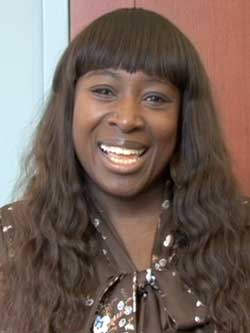Filed Under > Convocation
Abena Koomson: A teacher of note
If you're within earshot of Gloria Abena Koomson when she moves on to her next job in education as an administrator or a teacher, do not be surprised to hear her singing as she goes about her work.
Koomson (who goes by “Abena”), a graduate of TC’s Klingenstein Center for Independent School Education, is not only a veteran teacher and administrator but also a Broadway songstress. During a summer workshop with Bill T. Jones, she helped develop the role of the title character’s mother in the musical Fela, performing in the show off-Broadway and later as an understudy to Lillias White and Patti Labelle in the Broadway production. She finished her run on the show’s Nigerian tour where she met John Dramani Mahama, the current president of Ghana.
But at the end of the tour, she found she missed her previous life in education. “Teaching is my lifeblood,” says Koomson, who taught for 2 years at the Forman School in Litchfield, Connecticut and then served as both a teacher and a dean at the Winston Preparatory School in Manhattan for 9 years.
“So I started applying to different programs, and then a colleague of mine who had graduated from TC said, ‘You should look at Klingenstein; it might be exactly what you need.’ ”
For Koomson, Klingenstein – TC’s master’s program for heads and administrators of independent schools – proved a welcome opportunity to re-inhabit the role of student. “One of my favorite quotes is by Zora Neale Hurston, from ‘Their Eyes Were Watching God’: ‘There are years that ask questions and years that answer.’ And so this was one of those years where I just got to ask questions.”
The Klingenstein program provided answers on subjects ranging from philosophy and education and research to statistics, finances, resource allocation and negotiation. “Everything I studied was useful,” Koomson says. ‘There wasn’t anything I could just throw out the door. And because it was intensive, you really had to move at this thing with your whole heart. You couldn’t skimp. There’s no time for that.”
As a Klingenstein Fellow, Koomson was part of a team that designed a hypothetical institution called The Seven Hills School for its final project.
“It was like the Seven Hills of Rome, and each of the seven of us were the founders,” she recalls. “We had to come up with a comprehensive five-year budget. We had to decide the location of the school, what curriculum we were going to choose — we decided to go with an International Baccalaureate curriculum, because we wanted to be globally focused. I had to figure out the transportation budget and which transportation company we were going to use to get the kids to school. I mean, this is something that we were deeply invested in.”
Not surprisingly, Koomson also wrote the school song, which she rendered a capella in an interview:
“There’s a truth we know that we long to show: we can each make a change in this world. Working thoughtfully, in community, as the hopes of our hearts do unfurl. Looking out we seek to find, open hearts and open minds. We will take a chance, make a difference, climbing one great hill at a time.”
Koomson, who earned a master’s of arts in Education Leadership through the Department of Organization and Leadership, says combining singing with teaching seems the most natural thing in the world. “They’re interdependent within me,” she says. “They’re not separate. It’s not like over here I sing and over here I teach.”
She says she was not surprised to find she wasn’t the only one in her Klingenstein cohort with other talents.
“Teaching causes you to bring everything that you are,” she says. “So if you are a singer, then you bring that to your teaching. If you are a painter, you bring that to your teaching, if you love reading books, you bring that to your teaching. And that’s what makes teachers so important. We’re full human beings, and the best among us bring our entire selves. One of the most important things a teacher can share with their students is their passion. It teaches their students to be passionate themselves.”
Published Friday, Jun. 7, 2013
